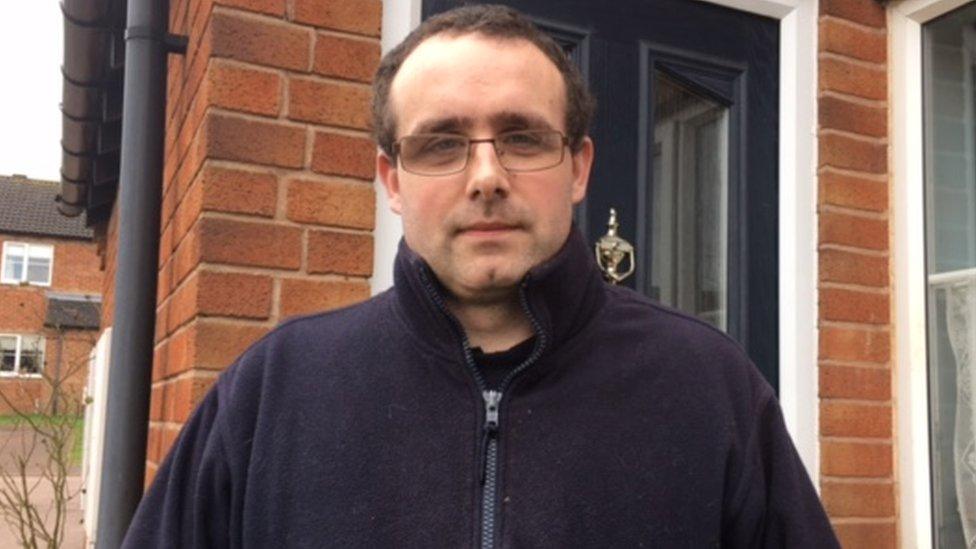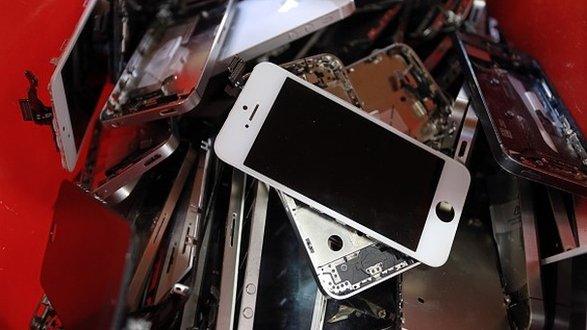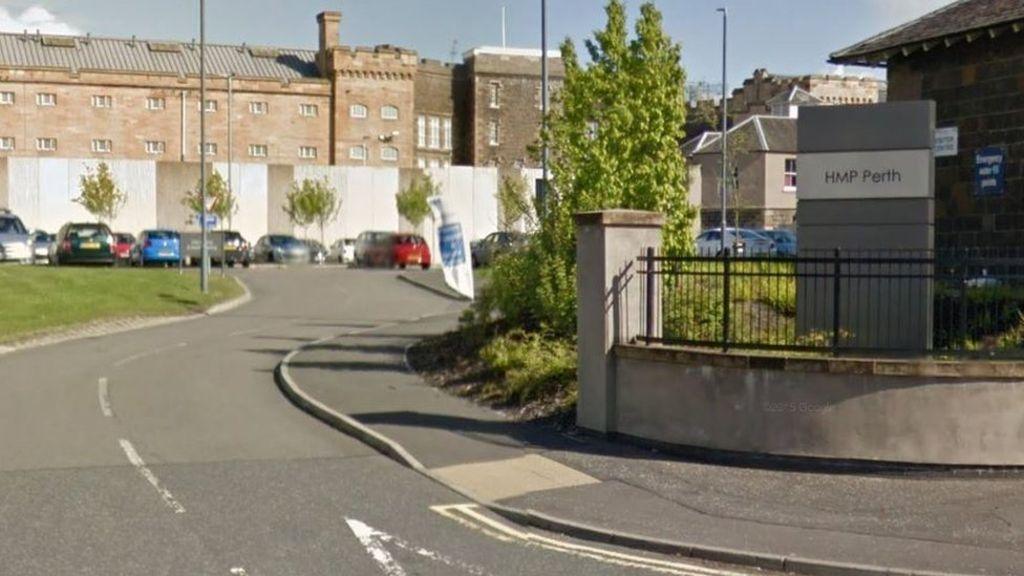Prison smuggler: 'I brought mobile phones in for criminals'
- Published

Drones are seen as an increasingly popular method for smuggling drugs and mobile phones into prisons, but having prison staff bring in contraband is also an effective route for prisoners.
A conversation with a prison inmate about football led James Almond to break the law himself.
The then prison worker was chatting about his favourite team Manchester United, when the prisoner he was speaking to suddenly asked him to bring in mobile phones, which are banned behind bars.
"He kept asking daily, and become aggressive with things he'd say," Almond says.
This was in 2014 when he was employed at Stocken Prison in Rutland.
The 33-year-old eventually agreed to bring phones in, and did so for a number of weeks before being caught, ending up in jail himself.
He's now telling his story so others can understand the pressure he came under from the prisoner and how unprepared he was for dealing with it.
His case highlights the problem of staff corruption in prisons in England and Wales, a problem some believe is being swept under the carpet.

Calls from prison-authorised phones are monitored, so some prisoners smuggle mobiles in
While there's broad agreement that the vast majority of prison staff conduct themselves with integrity and professionalism, a small number act corruptly - and their actions can have a disproportionate effect on stability and safety.
One well-informed source with extensive knowledge of the prison system told BBC Radio 4's File on 4 there was a working assumption that between three and five staff in every jail were corrupt, which equates to around 600 across England and Wales.
Out of some 33,000 prison officers and staff that's still a minority, but a not insignificant one.
Mobile phones in prisons: Why are they still there?
What is going wrong with the prison system?
James Almond never expected to be in that minority when he started working at HMP Stocken, which holds around 670 male offenders, many serving sentences for violence.
But his job as an operational support grade worker escorting building contractors in the prison developed. Before long he was out of his depth - having daily contact with prisoners, a role for which he claims he'd had no training.
"I did feel fairly vulnerable in the role, especially because at the time I was suffering heavily with depression after my father passed away.
"And that is the kind of thing these prisoners pick up on quite easily," he says.
Parcel smuggling
One particularly manipulative inmate, with whom Almond had begun discussing football, took advantage - threatening to harm relatives if he didn't comply.
"He really scared me with those threats. This gentleman was in prison for armed robbery. I didn't know what he was capable of."
The demands and threats wore Almond down and eventually he agreed to bring in a phone.
Mobiles are a valuable commodity, because they enable prisoners to keep in touch with their family and contact criminals on the outside - and calls are not monitored like the prison pay phones are.
Almond took part in four smuggling missions, collecting a package in a carrier bag from a stranger in a car park, slipping the parcel into his gym bag, then walking through the gates at Stocken.
"I was trying to just play it nice and cool," he says.
He says he never looked inside the packages, but it's thought they may also have contained drugs such as the potent synthetic cannabis substitute, Spice.
"It was a calculated risk that wasn't the day they decided... to do a staff search," he says, claiming he was never searched during his six months working there.
He received £500 for each parcel, double his weekly take-home pay, and acknowledges that as well as acting out of fear of the prisoner, the money was also "an incentive".
'Disproportionate effect'
John Podmore, who spent 25 years in the prison service - including a stint as head of the anti-corruption unit - believes low pay and a lack of adequate training are two key factors driving staff to bring in contraband.
He says corruption is an "inconvenient truth" which has far more of an impact than the well-publicised problem of drones, which deliver packages to prison cell windows or drop them inside perimeter walls.
"One prison officer bringing in one coffee jar full of Spice or cannabis can keep that jail going for a very long period of time and make an awful lot of money," he says.
"There is a disproportionate effect by this small minority of staff and that's what needs to be understood."
Reporting undercover from the prison front line
Officer at Maghaberry Prison injured in attack
A number of former prisoners I spoke to agreed that while drugs and phones are thrown over walls, brought in by visitors or sent through the post, corruption is a major source as well.
One man knew of a prison officer who brought in drugs in empty tubs of Pringles crisps. Another former inmate said staff had taken parcels directly from the post room to a prisoner without them being scanned.
And several ex-prisoners said some officers turned a "blind eye" to drug-dealing and drug-taking.

Leroy Smith says a corrupt prison worker will open the floodgates for contraband
"If you're doing a very, very long time and you're not going nowhere, it would be prudent to just leave you alone, and that's the kind of stance they took for a long while," says Leroy Smith.
He spent the best part of two decades in prison for the attempted murder of two policemen in 1994.
"The doors would be left open and everything was relaxed and people would just do whatever they wished within reason inside the jail."
Smith, who was eventually released in 2014 and has now written a book about his experiences, says corrupt staff didn't bring in drugs often, but when they did it had a profound effect.
"In five years you might have three times when it happens, but when it happens it's big because the whole place is saturated because it is just continuous - everyday they are just bringing it and bringing it and bringing it," he says.
The Ministry of Justice, which is responsible for prisons in England and Wales, says it remains "vigilant" to the threat posed by corruption and takes "swift action" against those involved.
The department is investing £3m in a new intelligence unit, developing a corruption strategy and considering introducing a prison-specific offence of corruption.
Safety issues
Jerry Petherick, one of the country's most experienced prison managers who worked in the public sector for 23 years before joining the private company G4S more than a decade ago, says they do their "damnedest" to catch corrupt staff.
He once sparked an investigation after spotting an expensive car parked outside a prison - it belonged to a member of staff, who turned out to be corrupt.
"It may seem strange for me to say that we actually celebrate those successes," says Mr Petherick, who believes the publicity acts as a deterrent.
"The vast majority of staff do not want to be associated with, do not want to work alongside corrupt members of staff because it puts their safety at risk," he says.
Almond accepts that his actions could have put staff at Stocken Prison at risk.
He was given a 12-month jail sentence for bringing in the phones. After being released early, probation staff helped him find a new job, in a factory.
Almond says the Prison Service should improve training for staff so they're better able to handle manipulative prisoners, but accepts he must take most of the blame for what he did, and it could have been much worse.
"It did occur to me that this was enabling the prisoner... to carry on with their, maybe, drug enterprises on the outside, getting drugs into the prison, and being able to organise a riot or things like that," says Almond.
"It could have resulted in injuries to a lot of staff."
File on 4 is broadcast on BBC Radio 4 at 20:00 GMT on Tuesday 14 March and 17:00 GMT on Sunday 19 March.
- Published8 February 2016

- Published10 March 2017

- Published22 September 2016
